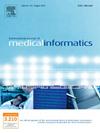Comparing physician and large language model responses to influenza patient questions in the online health community
IF 3.7
2区 医学
Q2 COMPUTER SCIENCE, INFORMATION SYSTEMS
International Journal of Medical Informatics
Pub Date : 2025-02-18
DOI:10.1016/j.ijmedinf.2025.105836
引用次数: 0
Abstract
Introduction
During influenza season, some patients tend to seek medical advice through online platforms. However, due to time constraints, the informational and emotional support provided by physicians is limited. Large language models (LLMs) can rapidly provide medical knowledge and empathy, but their capacity for providing informational support to patients with influenza and assisting physicians in providing emotional support is unclear. Therefore, this study evaluated the quality of LLM-generated influenza advice and its emotional support performance in comparison with physician advice.
Methods
This study utilized 200 influenza question–answer pairs from the online health community. Data collection consisted of two parts: (1) A panel of board-certified physicians evaluated the quality of LLM advice vs physician advice. (2) Physician advice was polished using an LLM, and the LLM-rewritten advice was compared to the original physician advice using the LLM module.
Results
For informational support, there was no significant difference between LLM and physician advice in terms of the presence of incorrect information, omission of information, extent of harm or empathy. Nevertheless, compared to physician advice, LLM advice was more likely to cause harm and to be in line with medical consensus. LLM was also able to assist physicians in providing emotional support, since the LLM-rewritten advice was significantly more respectful, friendly and empathetic, when compared with physician advice. Also, the LLM-rewritten advice was logically smooth. In most cases, LLM did not add or omit the original medical information.
Conclusion
This study suggests that LLMs can provide informational and emotional support for influenza patients. This may help to alleviate the pressure on physicians and promote physician-patient communication.
比较医生和大型语言模型对在线健康社区中流感患者问题的回答
在流感季节,一些病人倾向于通过网络平台寻求医疗建议。然而,由于时间限制,医生提供的信息和情感支持是有限的。大型语言模型(LLMs)可以快速提供医学知识和同理心,但它们为流感患者提供信息支持和协助医生提供情感支持的能力尚不清楚。因此,本研究评估了法学硕士产生的流感建议的质量及其与医生建议的情感支持表现。方法本研究利用来自在线健康社区的200对流感问答。数据收集包括两个部分:(1)一个由委员会认证的医生组成的小组评估法学硕士建议与医生建议的质量。(2)使用LLM对医生建议进行润饰,并使用LLM模块将LLM重写的建议与原始医生建议进行比较。结果在信息支持方面,LLM和医生建议在信息不正确、信息遗漏、伤害程度和共情方面无显著差异。然而,与医生的建议相比,法学硕士的建议更有可能造成伤害,也更符合医学共识。法学硕士还能够帮助医生提供情感支持,因为法学硕士重写的建议与医生的建议相比,显着更加尊重,友好和同情。此外,法学硕士重写的建议在逻辑上是流畅的。在大多数情况下,LLM并没有添加或省略原始的医疗信息。结论llm可为流感患者提供信息支持和情感支持。这可能有助于减轻医生的压力,促进医患沟通。
本文章由计算机程序翻译,如有差异,请以英文原文为准。
求助全文
约1分钟内获得全文
求助全文
来源期刊

International Journal of Medical Informatics
医学-计算机:信息系统
CiteScore
8.90
自引率
4.10%
发文量
217
审稿时长
42 days
期刊介绍:
International Journal of Medical Informatics provides an international medium for dissemination of original results and interpretative reviews concerning the field of medical informatics. The Journal emphasizes the evaluation of systems in healthcare settings.
The scope of journal covers:
Information systems, including national or international registration systems, hospital information systems, departmental and/or physician''s office systems, document handling systems, electronic medical record systems, standardization, systems integration etc.;
Computer-aided medical decision support systems using heuristic, algorithmic and/or statistical methods as exemplified in decision theory, protocol development, artificial intelligence, etc.
Educational computer based programs pertaining to medical informatics or medicine in general;
Organizational, economic, social, clinical impact, ethical and cost-benefit aspects of IT applications in health care.
 求助内容:
求助内容: 应助结果提醒方式:
应助结果提醒方式:


